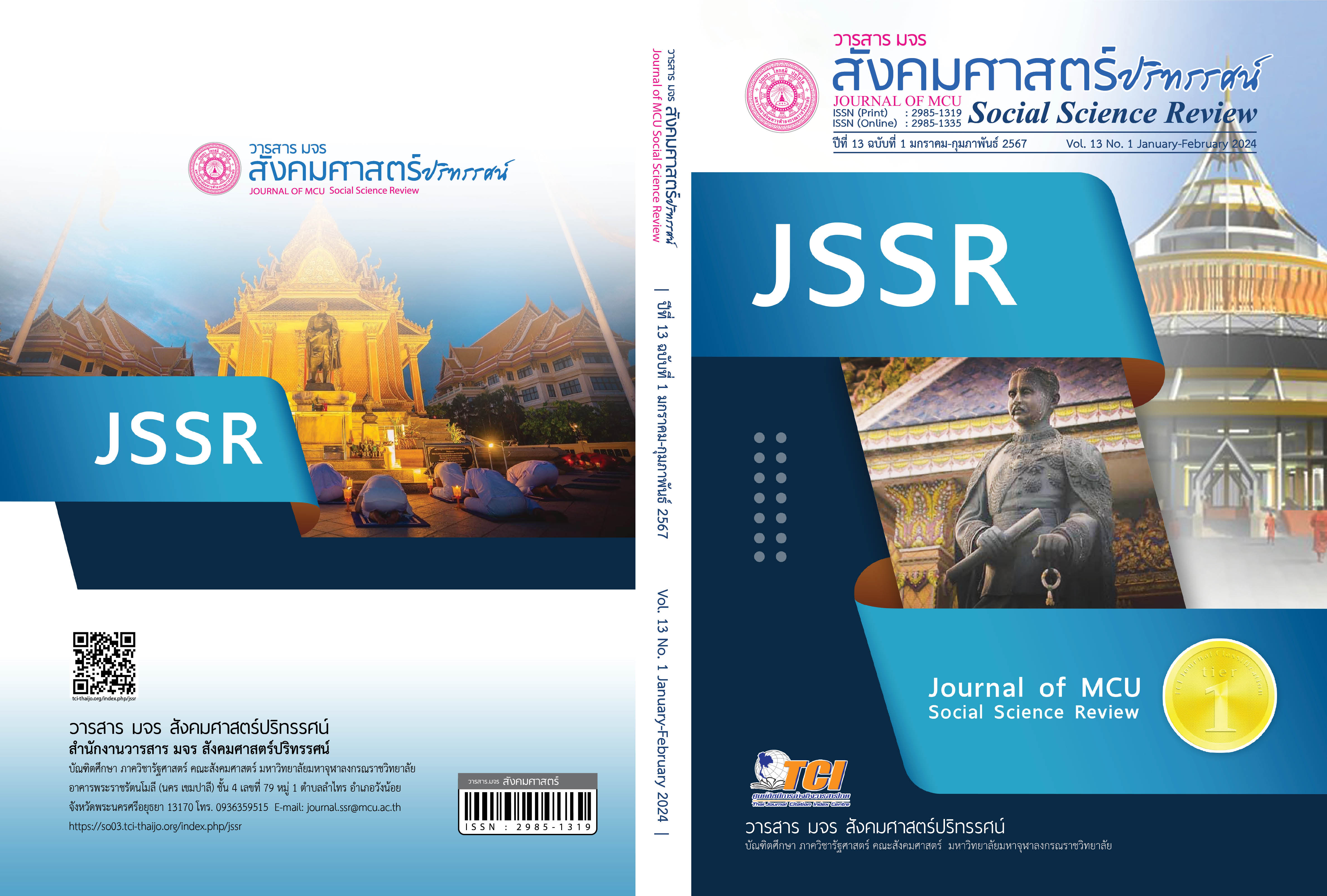แนวทางการพัฒนาทักษะการพูดสื่อสารภาษาอังกฤษด้วย TPACK Model ทางภาษาศึกษาและการเรียนรู้ภาษาฐานโครงงาน สำหรับผู้เรียนยุคดิจิทัล
คำสำคัญ:
รูปแบบความรู้เนื้อหาผนวกวิธีสอนและเทคโนโลยีทางภาษาศึกษา, ทักษะการพูดสื่อสารภาษาอังกฤษ, การเรียนรู้ภาษาฐานโครงงาน, ผู้เรียนยุคดิจิทัลบทคัดย่อ
รูปแบบความรู้เนื้อหาผนวกวิธีสอนและเทคโนโลยีทางภาษาศึกษา (TPACK Model) เป็นกรอบแนวคิดสำคัญสำหรับครูผู้สอนภาษาอังกฤษในศตวรรษที่ 21 ทำให้ครูสามารถออกแบบนวัตกรรมการสอนภาษาอังกฤษได้ตามบริบทของตนเอง โดยได้อธิบายถึงเนื้อหา วิธีการสอน และเทคโนโลยีสำหรับครูผู้สอนภาษาอังกฤษประยุกต์ใช้ออกแบบการจัดการเรียนการสอนที่เน้นผู้เรียนเป็นสำคัญ บทความนี้มีวัตถุประสงค์เพื่อนำเสนอแนวทางการใช้ TPACK Model ทางภาษาศึกษาเพื่อออกแบบกระบวนการสอนสำหรับการพัฒนาทักษะการพูดสื่อสารภาษาอังกฤษ ซึ่งประกอบด้วยเทคนิคการสอนภาษาอังกฤษเพื่อการสื่อสาร การเรียนรู้ภาษาฐานโครงงาน และการใช้เทคโนโลยีในการจัดการเรียนการสอนในรายวิชาภาษาอังกฤษเพื่อการสื่อสารของนักเรียนระดับมัธยมศึกษาปีที่ 1 ผู้เขียนได้นำเสนอตัวอย่างการออกแบบแผนการจัดการเรียนรู้ภาษาอังกฤษด้วย TPACK Model เพื่อพัฒนาทักษะการพูดสื่อสารภาษาอังกฤษของผู้เรียนยุคดิจิทัล ซึ่งส่งเสริมทักษะผู้เรียนในศตวรรษที่ 21 เช่น ทักษะด้านความร่วมมือและการทำงานเป็นทีม ทักษะด้านคอมพิวเตอร์ และสารสนเทศและการสื่อสาร ทักษะด้านอาชีพและทักษะการเรียนรู้ ให้แก่ผู้เรียนในยุคดิจิทัลอย่างยั่งยืน
เอกสารอ้างอิง
จารุณี ทิพยมณฑล. (2563). การศึกษาภาษาสังคมและวัฒนธรรม. กรุงเทพฯ: จรัลสนิทวงศ์การพิมพ์.
ชนันภรณ์ อารีกุล. (2562). การศึกษาทางเลือก : รูปแบบการเรียนรู้ที่สำคัญสำหรับเจเนอเรชันแอลฟา. วารสาร มจร สังคมศาสตร์ปริทรรศน์, 8(3), 270-283.
ชัยวัฒน์ สุทธิรัตน์. (2559). 80 นวัตกรรมการจัดการเรียนรู้ที่เน้นผู้เรียนเป็นสำคัญ (พิมพ์ครั้งที่ 7). นนทบุรี: พี บาลานซ์ดีไซด์แอนปริ้นติ้ง.
ถนอมพร เลาหจรัสแสง. (2561). นวัตกรรมเทคโนโลยรสารสนเทศเพื่อการศึกษาในยุคการเรียนรู้ 4.0. เชียงใหม่: ตองสาม ดีไซน์.
ทิศนา แขมมณี. (2554). รูปแบบการเรียนการสอน : ทางเลือกที่หลากหลาย. กรุงเทพฯ: จุฬาลงกรณ์มหาวิทยาลัย.
แสงระวี ดอนแก้วบัว. (2558). ภาษาศาสตร์สำหรับครูสอนภาษาอังกฤษ. กรุงเทพฯ: จุฬาลงกรณ์มหาวิทยาลัย.
Bender, W. N. (2012). Project-Based Learning: Differentiating Instruction for the 21st Century. Retrieved March 20, 2022, from https://shorturl.asia/tuZ8K
Bueno, A., et al. (2006). TEFL in Secondary Education.Granada: Editorial Universidad de Granada.
Magana, S. (2017). Disruptive classroom technologies: a framework for innovation in education. Corwin, A SAGE Company.
Mishra, P., & Koehler, M. J. (2006). Technological pedagogical content knowledge: A framework for teacher knowledge. Teachers College Record, 108(6), 1017-1054.
Shamim A., et al. (2020). EXPLORING THE SIGNIFICANCE OF SPEAKING SKILL FOR EFL LEARNERS. PalArch’s Journal of Archaeology of Egypt/Egyptology, 17(9), 6019-6030.
Siemens, G. (2004). Connectivism A Learning Theory for the Digital Age. Retrieved January 17, 2022, from http://www.elearnspace.org/Aricles/
Sriprom, C., et al. (2019). Personality Traits of Thai Gen Z Undergraduates: Challenges in the EFL Classroom?, PASAA, 57, 165-190.
Vygotsky, L. S (1997). Thought and language. Alex Kozulin revies and edit. Cambridge: The M. I. I. Press
ดาวน์โหลด
เผยแพร่แล้ว
รูปแบบการอ้างอิง
ฉบับ
ประเภทบทความ
สัญญาอนุญาต
ลิขสิทธิ์ (c) 2024 วารสาร มจร สังคมศาสตร์ปริทรรศน์

อนุญาตภายใต้เงื่อนไข Creative Commons Attribution-NonCommercial-NoDerivatives 4.0 International License.
เพื่อให้เป็นไปตามกฎหมายลิขสิทธิ์ ผู้นิพนธ์ทุกท่านต้องลงลายมือชื่อในแบบฟอร์มใบมอบลิขสิทธิ์บทความให้แก่วารสารฯ พร้อมกับบทความต้นฉบับที่ได้แก้ไขครั้งสุดท้าย นอกจากนี้ ผู้นิพนธ์ทุกท่านต้องยืนยันว่าบทความต้นฉบับที่ส่งมาตีพิมพ์นั้น ได้ส่งมาตีพิมพ์เฉพาะในวารสาร มจร สังคมศาสตร์ปริทรรศน์ เพียงแห่งเดียวเท่านั้น หากมีการใช้ภาพหรือตารางหรือเนื้อหาอื่นๆ ของผู้นิพนธ์อื่นที่ปรากฏในสิ่งตีพิมพ์อื่นมาแล้ว ผู้นิพนธ์ต้องขออนุญาตเจ้าของลิขสิทธิ์ก่อน พร้อมทั้งแสดงหนังสือที่ได้รับการยินยอมต่อบรรณาธิการ ก่อนที่บทความจะได้รับการตีพิมพ์ หากไม่เป็นไปตามข้อกำหนดเบื้องต้น ทางวารสารจะถอดบทความของท่านออกโดยไม่มีข้อยกเว้นใดๆ ทั้งสิ้น





